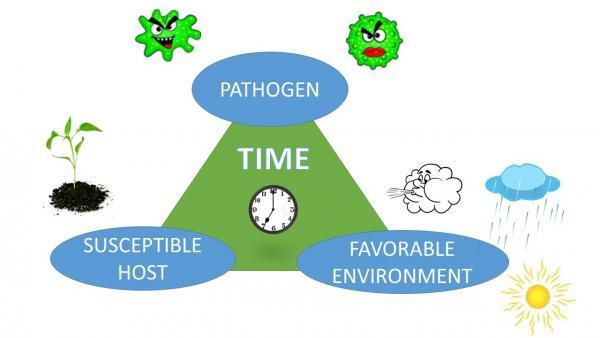The abundant rainfall and warm weather over the past few weeks has unleashed a potential plague of weeds, insects, and garden diseases. It appears that spring is coming early this year! So far, we are about ten inches above normal for rainfall in North Georgia. Soil temperatures are warming up fast, which means this weekend is the last chance you will have to apply a spring pre-emergent on your lawn to avoid summer weeds. Crabgrass is already starting to germinate in 55F degree soils.
Wet spring conditions will favor many blossom blight and fruit rot diseases on apples (black rot), pears (fire blight), peaches (brown rot), blueberries (botrytis blight) and plums (brown rot). Since these fruit trees are starting to bloom, you should already be spraying a fungicide to protect the flowers and young fruit from certain diseases. Avoid spraying any products that contain insecticides that might affect your pollinators during full bloom. After the blooms are gone, you can switch to a combination home orchard spray with an insecticide, if you desire.
Are you getting spring fever and ready to plant your summer vegetable garden? There are a few things to consider before planting. First, the soil will need to dry out enough to work the soil without sticking to your tiller and compacting the soil into mud bricks. Use the “squeeze test” with a clump of soil in your hand to check soil moisture. If the soil stays in a ball, it’s too wet to till. If it starts to fall apart in your hand, then it’s ready to turn the soil.
The second consideration is the soil temperature, which should ideally average 65F to 70F degrees at a 4” inch soil depth for a week before you plant most summer vegetables. Planting in cooler soils will lead to poor seed germination and encourage root disease issues. Direct seeding in soils just a few degrees too cold could delay seed germination as much as 14 days compared to the ideal temperature, which might only take 5 to 7 days. The longer seeds take to germinate, the more likely they will rot or get diseased.
You can track soil temperatures through your local weather station online: www.georgiaweather.net. Navigate the website buttons to the calculator for soil temperature. Choose the nearest weather station to your home: Rome, Ball Ground, Dallas, or Calhoun. Currently, soil temperatures in Rome are averaging about 57F degrees at a 4” soil depth. We’re on track to warm up enough to plant in early April if the soil dries out. This is a few weeks earlier than the historical average.
Another consideration is soil pH and fertility. Good soil fertility is essential to keeping your plants healthy so they can better tolerate insects and diseases. When was the last time you did a soil test on your garden? If it’s been a few years, you should submit a soil sample for testing at the County Extension office. If your soil pH is too high or too low, then you’re wasting your time and money on fertilizer, since it will not be available to the plants. The ideal pH is around 6.5 for most vegetables. Call the County Extension office about how to collect a soil sample or go online to www.soiltest123.com.
For more information, UGA Extension has over thirty free publications online about home gardening and growing specific vegetables for Georgia at https://t.uga.edu/5LI. Do your homework and select disease resistant varieties that are recommended for Georgia. One factsheet you might want to read is “Disease Management in the Home Vegetable Garden,” which is an important consideration given the weather this spring.
###
Paul Pugliese is the Extension Coordinator and Agricultural & Natural Resources Agent for Bartow County Cooperative Extension, a partnership of The University of Georgia, The U.S. Department of Agriculture, and Bartow County. For more information and free farm, lawn, or garden publications, call (770) 387-5142 or visit our local website at ugaextension.org/bartow.

